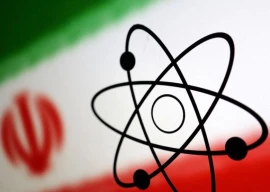
If a railways ministry proposal goes through, goods can be seamlessly sent from Calcutta all the way to Istanbul via cargo trains. The only entity standing in the way, quite literally, is Islamabad.
The ministry has proposed signing an agreement with India to grant it permission to use Pakistan’s rail services for transporting goods from Wahga to Iran, an official from the ministry told The Express Tribune.
The service could be provided using the Gul Cargo Train, an international freight service between Pakistan, Iran and Turkey that was started in 2009.
The train held its inaugural trial run in 2011 but was abandoned for several reasons.
“We recently forwarded the proposal to the ministry of commerce, for discussions with the Indian government,” the official said.
“India will definitely like the agreement … it will help them export to the Central Asian States and other countries in the region quicker and cheaper, compared to other transportation arrangements,” the official added.
An agreement to that effect would not only help Pakistan Railways bring Gul Train back into operation, but could also prove to be a profitable venture for the ailing railways, the source said.
Clubbing with PATTA
The proposed agreement could also be made part of the Pakistan-Afghanistan Transit Trade Agreement (PATTA), signed in Kabul in 2010, the official said.
Under PATTA, Afghanistan is entitled to transport its India-bound cargo through Pakistan. Afghan trucks enter Pakistan at Torkham, and transfer their goods to Indian trucks at Wahga.
However, Indian exports to Afghanistan were not allowed under PATTA. The accord said the issue could be discussed “at an appropriate time in the future.”
The railways ministry official said the new proposal, allowing India to trade with Iran via Pakistan, should also be considered when officials reconsider PATTA.
Troubles with Gul Train
During its pilot operation, the scheduled time for Gul Train to reach its destination was 14 days.
However, at a meeting in June, railways officials of Pakistan, Iran and Turkey agreed to reduce the scheduled time to nine days.
After reducing the scheduled time, Gul Train will be in a better position to attract Pakistani exporters and importers, said the railways official.
Traders’ reluctance regarding the journey time was one of the major factors for financial losses that forced Pakistan Railways to suspend the train’s operations in January 2012.
Former president of All Pakistan Commercial Exporters Association, Atif Rashid Khawaja, told The Express Tribune that high freight charges were another reason exporters abandoned the Gul Train services.
On this problem, the railways official said that freight charges for the Pakistani business community would be reduced if Pakistan and India signed the proposed agreement.
Published in The Express Tribune, November 1st, 2012.
COMMENTS (5)
Comments are moderated and generally will be posted if they are on-topic and not abusive.
For more information, please see our Comments FAQ

















@Ringo Starr: @It Is (still) Economy Stupid: @Logic: "Take the first step and allow it. If the Indians or anyone else do not want to use it for any reasons let it be" The whole viability issue turns on the fact that India will agree to your terms. So, logically, you cannot even take the first step until you have satisfied India about all issues pointed by It Is (still) Economy Stupid and more. As Ringo Starr has pointed out you have already chalked a failure, minus India!
Just do it.
@Logic: You're missing the point dude..The "first step" was taken and you guys failed miserably, as always..
Take the first step and allow it. If the Indians or anyone else do not want to use it for any reasons let it be.
By blocking NATO supply route Pakistan has lost credibility of being reliable transit route. Politics aside NATO is paying reasonably good rate and has reasonable protection still the supply is looted and sold in black market. Supply is linked to emotional outburst of interest groups including so called non state actors. If India or Bangladesh decided to join hands in moving goods through Pakistan who will provide security of goods and the train carrying it? What is the guarantee that one sneeze and the supply will be stopped for lack of apology? Will it be linked to what goods can go through Pakistan e.g. textile can not go through because it will damage domestic industry? What is the guarantee that the rates charged to business-people will not fluctuate and will be subject to Baksheesh?
It is only possible if dedicated lines that are properly fenced and secured and trains initially move nonstop till trust is built.